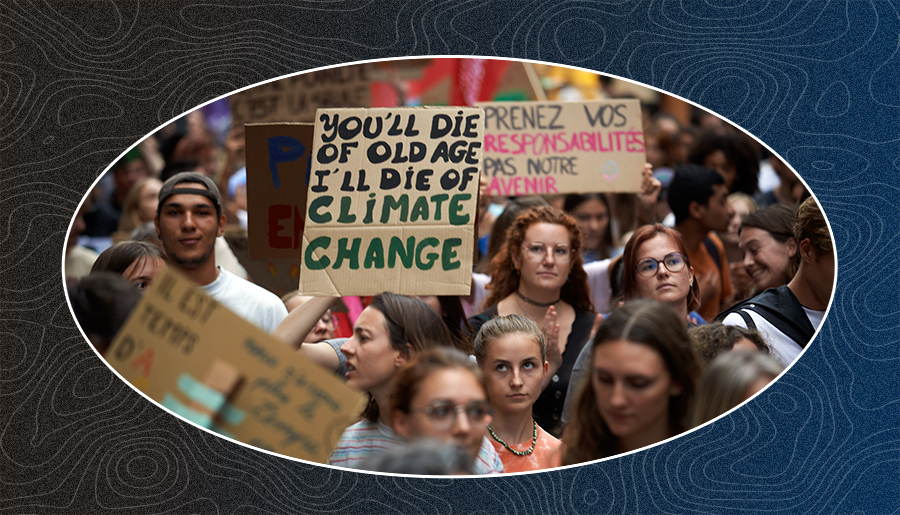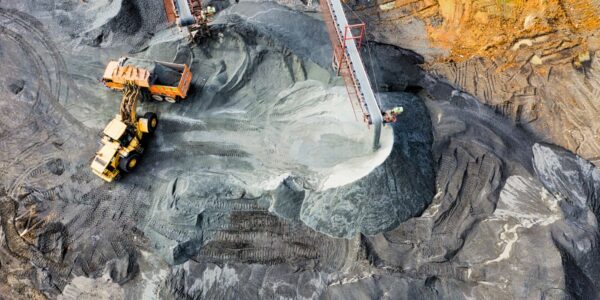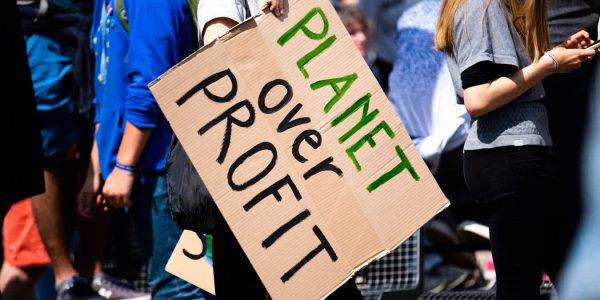If at first you don’t succeed, try 27 times again.
COP27 is now done and dusted. In the Egyptian city of Sharm El-Sheik, the world leaders gathered to update and implement changes to their climate action policies. They did this as the UN warned that the past eight years have been the hottest ones on record.
Nearly 200 countries sent representatives to COP27, with more than 120 of them being heads of state. They participated in negotiations after negotiations in an effort to mitigate the planet’s climate crisis.
Progress on last year’s COP26 agreements was scrutinised throughout this conference, with just 29 countries having delivered on the promise of ‘revisiting and re-strengthening’ their climate commitments since last time. Thankfully, that does actually include us, as Australia committed to cutting carbon emissions by 46% earlier this year.
Here’s the lowdown on what happened at this internationally significant meeting and whether it’ll actually mitigate our effects on this pale blue dot.
Laying the Foundations
Last Sunday, the welcome event saw the United Nations leader warn that our planet is “sending a distress signal.” Secretary-General Antonio Guterres was responding to a newly-released UN climate report released to coincide with the opening of the event that shows the past eight years have been the warmest on record.
This has somewhat set the tone for the event, which shaped up to be a much more gloves-off, time-for-action kind of meeting than in previous years.
With a debate over the COP27 agenda causing initial delays, the structure moving forward was established last Monday. One of the major questions being discussed was: How much financial support should developed nations provide poor and vulnerable countries?
“Vulnerable nations have tirelessly appealed for help to cope with the alarming and damaging climate impacts that they hold little responsibility for causing,” said the World Resources Institute’s President, Ani Dasgupta.
“Today, countries cleared a historic first hurdle towards acknowledging and answering the call for financing to address increasingly severe losses and damages.”
The UN and our nations will be using the shorthand “loss and damages” to refer to this topic.
The UN was also critical of those nations who have not yet updated their climate targets as agreed upon at the last COP meeting.
“Only 29 countries had come forward with tightened national plans since COP26. Twenty-nine is not 194. So here I am now looking out at 165 countries that are due to be revisiting and strengthening their national pledges this year,” said Simon Stiell, the UN’s Climate Change Executive Secretary.
“I will not be a custodian of backsliding. We know what must be done by everybody everywhere, every single day, doing everything we possibly can. Colleagues, it’s time to get to work.”
Fighting Words
In the opening days, the big speeches and addresses given by world leaders dominated the headlines. Many used their address to demand more from other nations as COP27 descended into something of a blame game.
Cyril Ramaphosa
Ramaphosa argued for South Africa to receive $84 billion worth of international funding over the next five years. He claimed this is the amount needed in order to cut his nation’s carbon emissions while still taking care of the needs of his communities.
“The scale of funding that is required to achieve our country’s ambition is significantly higher, much higher than the funding that has been offered,” said Ramaphosa. “That is the message we will be taking forward.”
Shehbaz Sharif
Pakistan’s Prime Minister also asked industrialised nations for support. He wanted real action on climate change to happen so that Pakistan’s disastrous flooding won’t be further exacerbated in years to come.
“Extreme climatic events in Pakistan and the Horn of Africa this year have showcased the globalisation of climate change,” said Sharif. “Turning a blind eye to its lethal effects will be criminal.”
Rishi Sunak
The UK PM gave what has been described as a “tepid and uninspiring” speech after the former PM, Boris Johnson burnished his credentials on the world stage and claimed credit for the success of last year’s conference.
Sunak said, “The world came together in Glasgow with one last chance to create a plan that would limit global temperature rises to 1.5 degrees. The question today is: Can we summon the collective will to deliver on those promises?”
“By honouring the pledges we made in Glasgow, we can turn our struggle against climate change into a global mission for new jobs and clean growth. And we can bequeath our children a greener planet and a more prosperous future.”
Sunak also pledged to triple the UK’s climate adaptation budget to £1.5bn ($2.65 billion). This money is part of a broader £11.6bn ($20.47 billion) commitment to international climate finance.
The money will go to protect the Congo Basin from deforestation, support Indigenous and forest communities, and other biodiversity protection programmes around the world.
Emmanuel Macron
French President Macron used part of his speech to say that all deep-sea mining should cease. He also said that, despite the fact that Russia is waging war against Ukraine, each nation should continue to fight against the climate crisis. This is a notable statement because Russia is creating global shortages and withholding its natural gas supply from the rest of Europe.
Macron said, “We will not sacrifice our climate commitments under the energy threat from Russia, and therefore all the commitments held by nations must be upheld.”
Mia Mottley
Mottley, the Prime Minister of Barbados, used her time at COP27 to call out industrialised nations for not doing enough to help places like Barbados grapple with the climate crisis.
“We were the ones whose blood, sweat, and tears financed the industrial revolution,” said Mottley. “Are we now to face double jeopardy by having to pay the cost as a result of those greenhouse gases from the industrial revolution? That is fundamentally unfair.”
Moreover, Mottley criticised the World Bank for not providing non-industrialised nations with funding when they are decimated by climate events.
“We need to have a different approach, to allow grant-funded reconstruction grants going forward, in those countries that suffer from disaster. Unless that happens, we are going to see an increase in climate refugees. We know that by 2050, the world’s 21 million climate refugees today will become one billion.”
Volodymyr Zelenskyy
Understandably, Ukrainian PM Zelenskyy used his COP27 speech to discuss how Russia’s war on Ukraine is negatively impacting Earth’s climate.
In a video address, he said, “There can be no effective climate policy without peace. The Russian war has brought about an energy crisis that has forced dozens of countries to resume coal-fired power generation in order to lower energy prices for their people, to lower prices that are shockingly rising due to deliberate Russian actions.”
Zelenskyy also said, “The Russian war has destroyed five million acres of forests in Ukraine in less than six months.”
Australia’s Commitments at COP27
Here’s Australia’s commitments in chronological order:
Green Shipping Challenge
Australia signed up for the Green Shipping Challenge, a scheme focused on making the shipping industry more environmentally responsible. It currently produces over one billion tonnes of carbon dioxide each year.
“One of the actions Australia is taking is to sign a Green Economy Agreement with Singapore that includes measures to implement green shipping corridors using technology to decarbonise the sector,” said Minister for Climate Change and Energy, Chris Bowen.
Global Methane Pledge
Australia also signed up for the global methane pledge, a commitment launched at COP26 which now has 122 countries working to reduce methane emissions by “at least” 30% by 2030. The pledge is non-binding and has been described by Bowen as an “aspirational target.” Some $3.01 billion has been committed by the government to reduce our methane emissions.
The Forests and Climate Leaders Partnership
The Forests and Climate Leaders Partnership is another new international group that Australia has become a founding member of during COP27. It’s a commitment by 26 countries and the European Union to “halt and reverse forest loss and land degradation.”
Minister for the Environment and Water, Tanya Plibersek, said, “Australia is home to over 130 million hectares of native forest and the Australian Government is taking strong action to protect, manage and restore these vulnerable ecosystems.”
International Mangrove Alliance for Climate
We’ve also signed up to the International Mangrove Alliance for Climate, which aims to increase mangrove habitat by 20% by 2030. As one of the largest mangrove habitats on Earth, Australia will spend $9.5 million to restore five new domestic mangrove forests.
Will Australia Host COP31?
Australia made a bid to host COP31 in 2026, although whether or not we get that will largely depend on how rapidly we overcome the legacy of climate inaction pursued over the past decade. Although we’ve signed up to a few projects, we’re still well short of where we need to be.
Australia’s First Week
After the first week, the Climate Council said that Australia still has a lot to do, describing our progress as a “slow start.”
“Ministers Bowen and McAllister cannot leave Egypt without making new commitments to accelerate Australia’s move beyond coal and gas, and to increase support for vulnerable communities in our region and beyond,” said Dr Simon Bradshaw, Climate Council Research Director.
“At a bare minimum, the Government will need to join the US, UK, Germany, New Zealand and dozens of other countries in agreeing to end international public finance for fossil fuels, and will need to fully support the number one priority of Pacific Island countries at this COP – the establishment of a new facility to provide funding to communities facing loss and damage from climate change.”
Bowen used his speech at COP27 to critique the World Bank, saying that multilateral financial institutions are not stepping up to the challenge of climate change.
“The urgency with which we must act requires frank conversations about where we are now, where we are going, and how we are going to get there,” Bowen said. “Some of our international financial institutions are stepping up to this, our most important global task. Others are not.”
Bowen has argued that there is a moral need for financial institutions to work with nations to help them cut emissions, develop sustainably, and deal with climate fallout.
The World Bank chief said that he didn’t “even know” if climate change was real at a recent New York Times event.
Indigenous People Say They Are Being Forgotten
A Torres Strait Islander activist has criticised the global climate debate, saying that the way the world treats Indigenous people is an “insult”.
Kulkalgal man Yessie Mosby has said that he travelled to COP27 because he is “fighting for our home.” Rising sea levels have affected fruit trees in the region, killing off large numbers of them, while Mosby has said that Indigenous knowledge is being wasted and could become lost as the climate changes.
Mosby is part of a group that successfully petitioned the Australian government for climate-based compensation due to inaction. He is speaking at several COP27 talks throughout the event in an effort to inspire other Indigenous groups to do the same.
Writing in The Conversation, Chief Ninawa Huni Kui of the Huni Kui Indigenous people of the Amazon has said that talks at COP27 “reproduce colonial patterns of unsustainable economic growth, ecological destruction and Indigenous dispossession that have been responsible for climate destabilisation in the first place”.
He has said that colonialism is the “elephant in the room” at the conference that no one wants to talk about.
COP27 Targets Industry and Business
On day three, the UN released a report called Integrity Matters, and it’s chockfull of climate-saving recommendations that they want businesses to adopt.
The recommendations include:
- Making it so companies can’t claim to be net zero while building or investing in new fossil fuel supplies.
- Making it so companies can’t buy cheap carbon credits, which are sometimes dodgy. They’ll have to cut their own emissions instead of relying on another organisation to do this work for them.
- Making it so companies have to aim at eradicating their emissions instead of reducing them.
- Making it so companies cannot lobby to undermine a nation’s climate goals and policies.
- Making it so companies have to follow certain regulations in order to meet a net zero greenhouse emissions target by 2050.
“Though countries need to take the lead, solving the climate crisis is not up to them alone,” said the chair of this report, Catherine McKenna.
“Non-state actors: Industry, financial institutions, cities, and regions play a critical role in getting the world to net zero no later than 2050. They will either help scale the ambition and action we need to ensure a sustainable planet or else they strongly increase the likelihood of failure. The planet cannot afford delays, excuses, or more greenwashing.”
Protest (But Not Too Loudly)
Protests at COP meetings are nothing new. However, this year, activists have brought heightened scrutiny to the practices of the Egyptian security forces.
A British-Egyptian activist and blogger Abd el-Fattah who became a leader of the 2011 uprising in Egypt has gone on a hunger and water strike to protest his innocence. His actions are threatening to take much of the shine off Egypt’s moment in the spotlight.
The US has stated it has “deep concern” for el-Fattah and wants the Egyptian government to free him. His family has been demanding to see proof he is still alive for the past four days but has so far been denied.
Egypt arrested dozens of protestors in the lead-up to the event, something that Human Rights Watch condemned. The government, wanting to be seen to allow the right to protest but not actually have protests, set aside a tiny designated protest area away from the conference where groups could register to express their anger for an hour.
Civil society groups in attendance also criticised surveillance and intimidation at the event, with plane-clothed conference staff eavesdropping on conversations and surrounding anyone mentioning activism.
“Mentioning activism in conversation means you get ‘cleaners’ and technical staff coming over to you. Even on foreign government stands, the ‘cleaners’ will come up and listen,” one conference goer told The Guardian.
Shady Sponsors
Most major international conferences and events are supported and sponsored by private companies. However, the level of sponsorship and the brands chosen as corporate partners at this year’s COP27 raised some eyebrows.
One of the most concerning was the inclusion of Coca-Cola, one of the world’s leading plastic manufacturers. A Change.org petition was set up to remove the company as a sponsor of the event and it currently has 239,000 signatures.
“Coca-Cola spends millions of dollars greenwashing their brand, making us believe that they are solving the problem,” said petition author Georgia Elliott-Smith.
“But, behind the scenes, they have a long history of lobbying to delay and derail regulations that would prevent pollution, keeping us addicted to disposable plastic”.
Perhaps more concerning was the number of oil and gas lobbyists at the conference. 636 of them registered to attend this year’s event, a rise of more than 25% from last year. The only group with more people representing it at COP27 is the United Arab Emirates and that’s only because they’re hosting next year.
Once again, fossil fuel lobbyists outnumber every national delegation at COP27. Complete failure is of course ensured until they stop letting in the fossil fuel industry. It's a mockery of any real effort to stop Earth breakdown.
— Peter Kalmus (@ClimateHuman) November 14, 2022
The group Kick Big Polluters Out has written that “the influence of fossil fuel lobbyists is greater than frontline countries and communities. Delegations from African countries and Indigenous communities are dwarfed by representatives of corporate interests.”
America Vs. China
One of the biggest stand-offs at COP27 was between the US and China. The latter is now the world’s biggest greenhouse gas emitter, a title once held by the US, however, America has historically given more pushback when it comes to climate action.
What these two giants do will affect everyone and in many ways, it’s their decisions that will have the greatest global impact. This is why their interactions were watched closely.
President Biden and President Xi met on Monday ahead of the G20 summit in Bali where they talked for three hours about Taiwan, human rights, and nuclear war — and agreed to restart talks on climate action.
“The world expects, I believe, China and the United States to play key roles in addressing global challenges, from climate changes to food insecurity, and to — for us to be able to work together,” Biden said.
“The United States stands ready to do just that — work with you — if that’s what you desire.”
The two leaders agreed to continue to hold further talks on international cooperation as both are concerned about tension between the two superpowers. The meeting has been heralded as a “cooling off” of ongoing friction.
The US’s climate envoy, John Kerry, met with his Chinese counterpart Xie Zhenhua over the weekend and said that both nations were waiting to see “how things go with the G20” before resuming negotiations. However, neither of them has said what the outcome of the meeting will mean for their relationship.
Calls for compensation from both of these large emitters took place at COP27, with poorer nations like the Maldives saying they need nearly $12 billion to adapt to sea level rise. Because previous promises have failed to be delivered from more wealthy nations, there was reportedly a lot of distrust at these talks.
Kerry has said that the US “and many other countries” will not be tied into a deal that equates damage from climate change to financial liability. But this does not mean that money won’t flow eventually, and he has said he hopes to secure some kind of agreement with nations like China by 2024.
Is 1.5 Dead?
1.5 degrees Celsius is the global average temperature increase above pre-industrial era levels that the Paris Agreement was established to contain. The target has always been ambitious but is increasingly being seen as impossible, given that global emissions are still rising.
Alok Sharma, the former UK cabinet minister who headed COP26 warned that “We’ll either leave Egypt having kept 1.5C alive or this will be the Cop where we lose 1.5C.”
“We are already at 1.1C global warming, and I know I don’t have to remind all of you of the impact of that around the world. Even at 1.5C, we are still going to have devastating outcomes for many millions. As our friend from Bangladesh reminded us, 1.5 needs to be a red line. And this cannot be the Cop where we lose 1.5C.”
He added: “We’ve got to fight for this and every fraction of a degree absolutely makes a difference. It’s the difference … between a tolerable existence and an impossible future.”
The Global Carbon Project recently released a report saying that we will pass this level in nine years’ time. Keeping temperatures under 1.5 would mean seeing the equivalent drop in emissions that happened because of the pandemic every single year until we hit net zero. As emissions have now bounced back to record highs, that looks increasingly unlikely.
Australia has a big role to play in that. Our reliance on fossil fuel export and our plans to open new coal and gas projects means that we are global outliers in terms of per capita fossil fuel emissions. The global average is around 5.3 tonnes of carbon dioxide per person in each country, whereas Australia’s is 15.1.
Professor Frank Jotzo, director of the Centre for Climate and Energy Policy at ANU, has told the ABC that Australia has made decent progress at home but is being let down by our export market.
“A significantly stronger reduction than 43% could be achieved in Australia. There’s plenty of unharvested, low-hanging fruit after a decade of inaction on climate policy,” he said.
“But unless more is done in terms of policy intervention, we may not reach that target. It requires effort, but that effort is readily achievable.”
Tragically, by the end of COP27, the nations of Earth didn’t unite to keep the planet below 1.5 degrees. No ambitious plans were made. No miracles were brokered at the table.
A resolution to make 2025 the year of Earth’s peak emissions was removed from said agreement. Moreover, this situation would have been even worse if some countries succeeded at weaselling out of their pre-existing commitments.
If icebergs could weep this at this news instead of melt, they would.
Australia Rises in Global Climate Rankings… to 55th
The 18th annual Climate Change Performance Index was released at COP27 showing that Australia has climbed four places to the dazzling heights of 55 out of 59.
The CCPI ranks 59 countries and the European Union, covering some 92% of global greenhouse gas emitters, for their climate policies, greenhouse gas emissions, renewable energy use, and overall energy use.
Last year we came dead last, so it’s an improvement, but, as the Climate Council has said, we need to step up.
“There is no escaping just how far behind we are and how much catching up we’ve got to do,” said Climate Councillor and economist Nicki Hutley.
Letting us down is the fact that:
- Australia’s new 2030 emissions reduction target remains one of the weakest in the developed world.
- We are yet to start phasing out coal and gas production or even stop publicly funding it.
- Australia is falling well short of our fair share of international climate finance, which is a key focus at COP27.
Denmark, Sweden, Chile, Morocco, and India came top of the charts this year while Iran, Saudi Arabia, and Kazakhstan came in last. The US rose three ranks this year to 52 while China dropped 13 ranks to 51.
“Rather than decreasing fossil fuel production, governments are planning to, by 2030, produce twice the amount of fossil fuels globally than what is consistent with limiting
global warming to 1.5°C,” said the CCPI.
Sliding Backwards
‘Backsliding’ was the buzzword for COP27, with political leaders from France, Egypt, the UK, and the UN all stating that they didn’t want any to happen.
That, however, is exactly what many folks believe has happened. Countries are supposed to be building on existing agreements and going further. Instead, The Guardian has reported that some countries are instead attempted to walk back previous deals and water down their commitments.
“All of You Are War Criminals”
It was chaotic scenes at Russia’s COP27 event which was invaded by activists branding the panel of speakers “war criminals.” Protestors were quickly removed from the room, with the event’s chairperson saying that it was “about the climate agenda, not the political agenda.”
The BBC’s climate editor was also removed from the event after asking “are you going to pay for the environmental damage you have caused in Ukraine?”
Six men from the Russian Environment Ministry, the Russian President’s Office, the nation’s state-owned nuclear power company, and elsewhere, also managed to speak for 75 minutes without mentioning fossil fuels once.
The panellists said that Russia was a “climate responsible” nation, but argued that “coal is still alive” as a fuel resource in reference to a question about phasing out non-renewables.
Brazil is Back, Baby
Brazil’s President-elect, Luiz Inácio ‘Lula’ da Silva said that “Brazil is back” during a speech on day nine of COP27.
Lula, who recently won a narrow election against the outgoing ‘Tropical Trump’, President Jair Bolsonaro, made environmentalism a key focus of his campaign. In the first big overseas event he’s attended as incoming President, he was greeted with cheers and chanting and reportedly brought some “much-needed hope” to proceedings.
“Ole, ole, ola… Lula… Lula”
Big crowds waiting for @LulaOficial to speak at a side event at #Cop27 pic.twitter.com/cZuTWWL1rY
— Patrick Greenfield (@pgreenfielduk) November 16, 2022
“Today, I am here to say that Brazil is ready to join once again [the] effort to build a healthier planet,” Lula said.
“I would like to announce that efforts to fight climate change will have the highest priority in my next government. We will prioritise the fight against deforestation of all of our biomes and reverse the damage done in recent years by the previous government.
“These are hard times. But it was always in difficult times that humanity overcame challenges. We need more confidence,” he said.
Brazil has recently entered a partnership with the Democratic Republic of the Congo and Indonesia to collaborate on rainforest conservation. Lula said that not one more hectare of the Amazon would need to be chopped down in order to deliver a strong agricultural sector in Brazil.
Phase Down All Fossil Fuels Flopped
The conference got a bit of a boost on day nine as the resultant communique from the G20 meeting was released, offering disaster relief to developing nations impacted by climate change.
COP27 then worked towards the final agreements of the meeting, with draft text being written up at the moment that many hoped would contain the phrase “phase down all fossil fuels.”
The proposal was made by India on Monday but has since gained the support of many nations, including the United States and the European Union. The language “phase down” was changed from “phase out” at COP26 by China and India in reference to coal, something India now thinks unfairly impacts them.
“Natural gas and oil also lead to emission of greenhouse gases. Making only one fuel the villain is not right,” a source in India’s delegation at COP27 told the Press Trust of India.
However, some of the world’s biggest oil and gas producers probably weren’t thrilled by the idea of changing “phase down” to be “phase down all fossil fuels.” Saudi Arabia’s energy minister, Prince Abdulaziz bin Salman, said in an interview last week that they would be very unlikely to support an agreement that included the phasing down of oil.
In a rubbish turn of events, this change in language didn’t take place. Yup, we’re still “phasing down” our dangerous fossil fuel use, and won’t become more ambitious than that.
Loss and Damage
As previously noted, Loss and Damage refers to the act of developed nations financially supporting poor and vulnerable countries in their fights against the climate crisis. Additionally, this concept may soon become a reality, as the attendees of COP27 have agreed to set up a Loss and Damages fund.
It’s worth noting that there’s currently no consensus on how this fund will be created or who will fill up it with money. Hopefully, the leaders of our planet can figure this one out before it’s too late.
Read more stories from The Latch and subscribe to our email newsletter.







